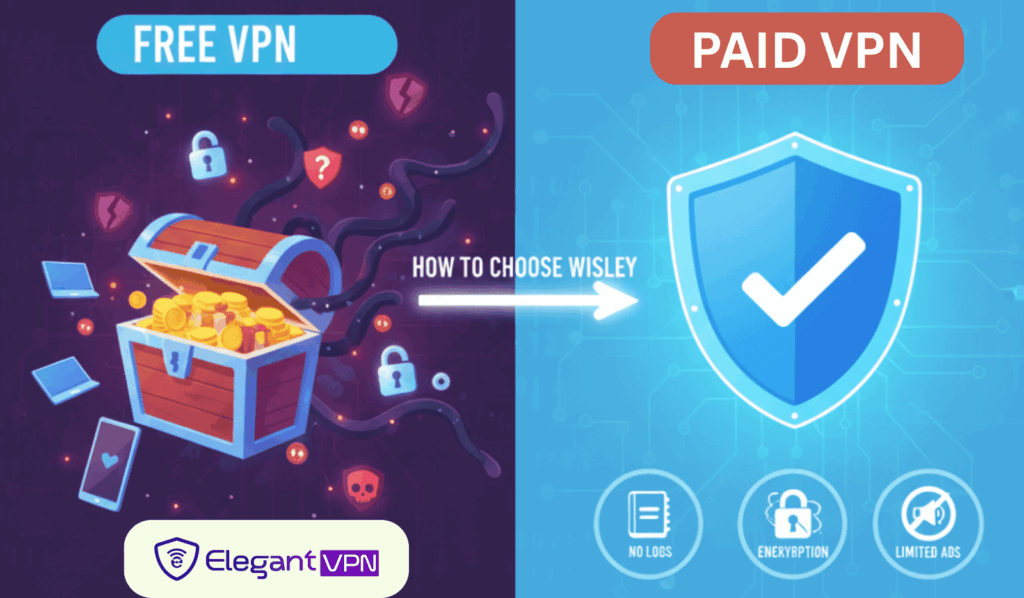Suppose, you’re at an airport, about to board a long flight. To kill time, you connect to the free Wi-Fi and start checking your email. Or maybe you’re traveling abroad, eager to catch your favorite Netflix show—only to see the dreaded “content not available in your region” message.
These moments feel all too familiar. Free Wi-Fi and geo-blocked streaming are part of modern life, but they come with hidden risks and frustrations. A VPN (Virtual Private Network) promises to solve these problems by keeping your connection private and unlocking global content.
But here’s the catch: not all free VPNs can be trusted. Some protect you well, while others slow you down—or worse, sell your data. That’s why learning how to choose a free VPN service is so important. In this guide, we’ll walk through everything you need to know to pick a safe, reliable, and useful free VPN that truly works for your needs.
In today’s digital world, online privacy is more critical than ever. Whether you’re browsing public Wi-Fi, streaming content from other countries, or protecting your sensitive data, a VPN is a must-have tool. But with so many free VPN services available, choosing the best free VPN can be overwhelming. This guide will help you select a secure, reliable, and high-performance free VPN that fits your needs.
Why You Need a Free VPN
A VPN (Virtual Private Network) encrypts your internet connection and hides your IP address, giving you anonymity online. Here’s why even a free VPN can be essential:
- Secure Browsing: Protect your data on public Wi-Fi and prevent hackers from intercepting sensitive information.
- Access Restricted Content: Stream geo-blocked services like Netflix, Hulu, or international websites.
- Maintain Privacy: Prevent ISPs, advertisers, and websites from tracking your online activity.
Even a free VPN can provide these benefits, but you must choose carefully to avoid limited speeds, poor security, or intrusive data collection.
Key Features to Look for in a Free VPN
When selecting a free VPN, consider the following critical factors:
1. Strong Encryption
- Look for AES-256 encryption, OpenVPN, or WireGuard protocols to keep your data secure.
- Avoid VPNs that don’t clearly disclose encryption standards.
2. No-Logs Policy
- The VPN should not track your online activity.
- Check privacy policies to ensure they do not store sensitive data.
3. Server Locations
- A higher number of servers provides better speed and more access to geo-restricted content.
- Ensure the free plan includes servers in multiple countries if you plan to unblock content.
4. Speed & Bandwidth
- Free VPNs often have bandwidth caps or slower speeds.
- Prioritize services that offer reasonable speed for streaming or browsing.
5. Device Compatibility
- Ensure the VPN supports all your devices: Windows, macOS, Android, iOS, and even browser extensions.
- Some free VPNs allow multiple simultaneous connections; check this if you use multiple devices.
Top Free VPN Services of 2025
Here’s a comparison of some of the best free VPN services currently available:
| VPN Service | Free Plan Limitations | Pros | Best For |
|---|---|---|---|
| Elegant VPN | Unlimited bandwidth | Fast servers, strong encryption, no-logs | Streaming & privacy |
| Proton VPN | Limited servers | No data cap, strong privacy policies | Secure browsing |
| Windscribe | 10GB/month | Multi-platform support, ad-blocker | Basic streaming & privacy |
| Hide.me | 10GB/month, 5 servers | High-speed servers, good privacy | Geo-unblocking |
| TunnelBear | 500MB/month | Easy-to-use interface, strong security | Beginners & casual users |
⚡ Tip: Always check for hidden limitations in free VPNs, like restricted server access or throttled speeds.
How to Avoid Common Pitfalls with Free VPNs
Free VPNs can be tempting, but not all are safe. Avoid these risks:
- Data Logging & Selling: Some free VPNs sell your browsing data to advertisers.
- Malware Risks: Avoid VPNs from unknown sources, as some apps may contain malicious software.
- Limited Features: Many free VPNs restrict server choice, speed, or device connections.
Choose reputable providers and verify their security and privacy policies before using them.
How to Decide the Best Free VPN for You
- Determine Your Primary Use: Streaming, privacy, or bypassing restrictions?
- Check Device Support: Ensure it works on all your devices.
- Compare Speeds and Bandwidth: Pick a VPN that meets your usage needs.
- Read Reviews: Look for real user experiences and ratings.
- Test Before Committing: Many free VPNs offer trials—test the performance first.
Beyond Free VPNs: When to Consider Paid Options
While free VPNs are excellent for casual browsing, you may want to upgrade for:
- Unlimited bandwidth and higher speeds
- Access to premium servers and advanced features
- Stronger security protocols and dedicated support
- Streaming globally without restrictions
Paid VPNs like NordVPN, ExpressVPN, and Surfshark often provide better overall performance while maintaining privacy and security.
FAQs About Free VPN Services
Q1: Are free VPNs safe to use?
Yes, but only if they are from reputable providers that have transparent privacy policies and strong encryption.
Q2: Can free VPNs unblock Netflix or Hulu?
Some can, but most free VPNs have limited server options, so access may be inconsistent.
Q3: Do free VPNs collect data?
Some do. Always read the privacy policy to ensure the VPN does not log or sell your data.
Conclusion: Choose Wisely and Protect Your Privacy
Selecting the best free VPN requires balancing speed, security, privacy, and device compatibility. Providers like Elegant VPN, Cure VPN, and RedGuard VPN offer reliable free plans that allow secure browsing and streaming freedom.
✅ Pro tip: Start with a free VPN to test features, then consider upgrading to a premium plan if you need more speed, servers, or unlimited bandwidth. Protect your online privacy today—because security is not optional.
